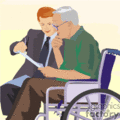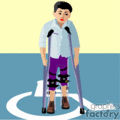Difference between revisions of "Physical Disabilities"
| Line 1: | Line 1: | ||
| − | + | *[[Physical Disability]] | |
A. Basic Information | A. Basic Information | ||
| Line 23: | Line 23: | ||
A wheelchair is part of the person's body space. Do not automatically hang or lean on the chair; it is similar to hanging or leaning on the person. It is fine if you are friends but inappropriate otherwise. | A wheelchair is part of the person's body space. Do not automatically hang or lean on the chair; it is similar to hanging or leaning on the person. It is fine if you are friends but inappropriate otherwise. | ||
| − | |||
When it appears that a person needs assistance, ask if you can help. Most persons will ask for assistance if they need it. Accept a "no thank you"graciously. | When it appears that a person needs assistance, ask if you can help. Most persons will ask for assistance if they need it. Accept a "no thank you"graciously. | ||
| − | Accept the fact that a disability exists | + | Accept the fact that a disability exists. |
| − | People with physical disabilities are not "confined" to wheelchairs. They often transfer over to automobiles and to furniture. Some who use wheelchairs can walk with the aid of canes, braces, crutches or walkers. | + | People with physical disabilities are not "confined" to wheelchairs. They often transfer over to automobiles and to furniture. Some who use wheelchairs can walk with the aid of canes, braces, crutches or walkers. |
| − | |||
Provide assistance if you are asked. Never come up behind a person who uses a wheelchair and push them. | Provide assistance if you are asked. Never come up behind a person who uses a wheelchair and push them. | ||
Always ask first while facing the person. | Always ask first while facing the person. | ||
| − | Never take the door out of a person's hand to assist them in opening it, they may be using the door for balance | + | Never take the door out of a person's hand to assist them in opening it, they may be using the door for balance. |
Revision as of 10:24, 10 July 2010
A. Basic Information
Physical impairment refers to a broad range of disabilities which include orthopedic, neuro-muscular, cardiovascular and pulmonary disorders. People with these disabilities often must rely upon assertive devices such as wheelchairs, crutches, canes, and artificial limbs to obtain mobility. The physical disability may either be congenital or a result of injury, muscular dystrophy, multiple sclerosis, cerebral palsy, amputation, heart disease, pulmonary disease or more. Some persons may have hidden (non visible) disabilities which include pulmonary disease, respiratory disorders, epilepsy and other limiting conditions.
B. Considerations
Although the cause of the disability may vary, persons with physical disabilities may face the following difficulties:
Inability to gain access to inaccessible building or room.
Decreased eye-hand coordination.
Impaired verbal communication.
Decreased physical stamina and endurance.
Considerations:
If a person uses a wheelchair, conversations at different eye levels are difficult. If a conversation continues for more than a few minutes and if it is possible to do so, sit down, kneel, or squat and share eye level.
A wheelchair is part of the person's body space. Do not automatically hang or lean on the chair; it is similar to hanging or leaning on the person. It is fine if you are friends but inappropriate otherwise.
When it appears that a person needs assistance, ask if you can help. Most persons will ask for assistance if they need it. Accept a "no thank you"graciously.
Accept the fact that a disability exists.
People with physical disabilities are not "confined" to wheelchairs. They often transfer over to automobiles and to furniture. Some who use wheelchairs can walk with the aid of canes, braces, crutches or walkers.
Provide assistance if you are asked. Never come up behind a person who uses a wheelchair and push them.
Always ask first while facing the person.
Never take the door out of a person's hand to assist them in opening it, they may be using the door for balance.

